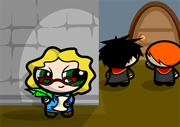Scientifics
The Curse of the Onion
Maya Winters
Anyone who’s ever been in a kitchen has doubtless encountered this fearsome enemy. Sadly, the onion is a horribly common ingredient and being smart like we humans are, we most commonly use it chopped up into tiny pieces – maximising the preparation time.
Why is it that there still seems to be no commonly agreed upon solution to this problem? How come we can build skyscrapers, cure countless diseases, and fly to the Moon but can still be reduced to a puddle of tears by a mere vegetable?
First, I will explain in reasonable, but not overwhelming, detail what exactly it is about the onion that can make us cry; after all, in their uncut, whole form they as are harmless as a potato (or any other root vegetable). The moment the onion turns into a potential threat to the tissue population is when it is cut.
As you slice into the onion you are in fact breaking up some of the cells within the onion. Now bear in mind that a number of chemical compounds are stored and used in cells and you can start to see the problem. In technical form, the amino acid sulphoxides released are broken down into sulphenic acids by enzymes from the cell and then yet more enzymes help transform the sulphenic acids into propanethiol S-oxide – a volatile gas. (In more simple terms: a load of the chemicals from the broken cells react and produce a nasty gas).
The volatile gas makes its way to your eyes and by this point, saving the tissues is a lost cause as the water in your eyes reacts with the gas to form sulphuric acid. The sulphuric acid is what causes the burning sensation in your eyes and as luck would have it, this burning makes your eyes create more tears which means there’s plenty of water for any remaining gas to react with.
The burning sensation and tears continue until all of the gas that made its way towards your eyes has reacted, but thankfully this time it should be short. In stating this, please note that I have assumed that you stop chopping the onion once your eyes are blurry with tears, if you haven’t, then you probably shouldn’t ever be let loose in a kitchen!
Now I’ll talk briefly about the possible methods to stop this phenomenon from occurring in the hope that the next generation may be saved from our suffering! The simplest options include wearing goggles to prevent the gas from reaching your eyes or having a fan turned on to carry away the gas as you chop. Goggles are indeed effective, but they can also make you look a bit odd to any people around you and they have a tendency to steam up and blind you.
Other options include the following:
- Cutting the onion whilst running it under cold water as the compounds produced are soluble in water and simply dissolve and are washed away.
- Chilling the onion before you cut it as it causes the enzymes mentioned earlier to slow down and they help produce the gas much more slowly.
- Cooking the onion before chopping it to completely destroy the enzymes preventing the gas from forming (this is why you don’t cry when only cooking onions)
- Make sure someone else ends up with the onion chopping job (seriously, worked on my sister and mother plenty of times as long as I was occupied with something else >.>)
Anyway, I hope you now feel better equipped to deal with this dreaded enemy and would highly recommend method 4) to be your chosen option whenever possible, in other cases it’s up to you – I wish you luck!
[Please note any actions you take are your own and the above are only suggestions and not to be taken as fact etc etc – basically, if you still cry, I am blameless *nod*]
